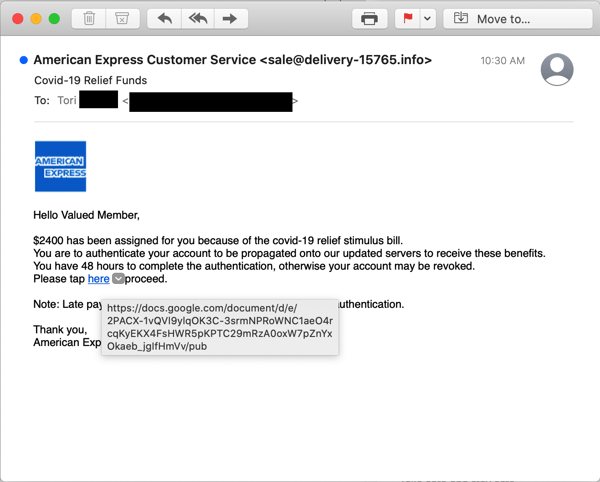 Last week the FBI warned Americans to be on the look-out for malicious emails attempting to bamboozle users with news surrounding economic fiscal stimulus checks that were to be delivered to citizens in coming weeks. A day later we reported on a pair of phishing emails that seemed to be using early versions of just that very social engineering scheme.
Last week the FBI warned Americans to be on the look-out for malicious emails attempting to bamboozle users with news surrounding economic fiscal stimulus checks that were to be delivered to citizens in coming weeks. A day later we reported on a pair of phishing emails that seemed to be using early versions of just that very social engineering scheme.
Well, today those much anticipated stimulus check phishes finally arrived -- in unambiguously proper form. Here's the first one that we spotted.

There are a couple of interesting aspects to this particular phish. First, the embedded link redirects through Google to a landing page on a server that is currently not responding. Either the server is down or is buckling under the load of users trying to get their stimulus checks. Just what that landing page delivers to users -- malware or a credentials phish -- is unknown at present, but it is sure to be malicious.
Second, although this phish is obviously tailored to exploit very recent news surrounding the COVID-19 outbreak, this kind of social engineering scheme is actually standard fare for the bad guys: spoofed emails purportedly hailing from American Express, Bank of America, Wells Fargo, Chase, or even PayPal and dangling supposed payments (aka free money, a favorite lure of fraudsters) in front of punters.
Third, wittingly or unwittingly, this particular social engineering scheme — which has Amex delivering government stimulus checks to recipients -- actually dovetails quite nicely with reality. See this Bloomberg article from yesterday.
We will undoubtedly see a number of variants on this one.
 Here's how it works:
Here's how it works:
